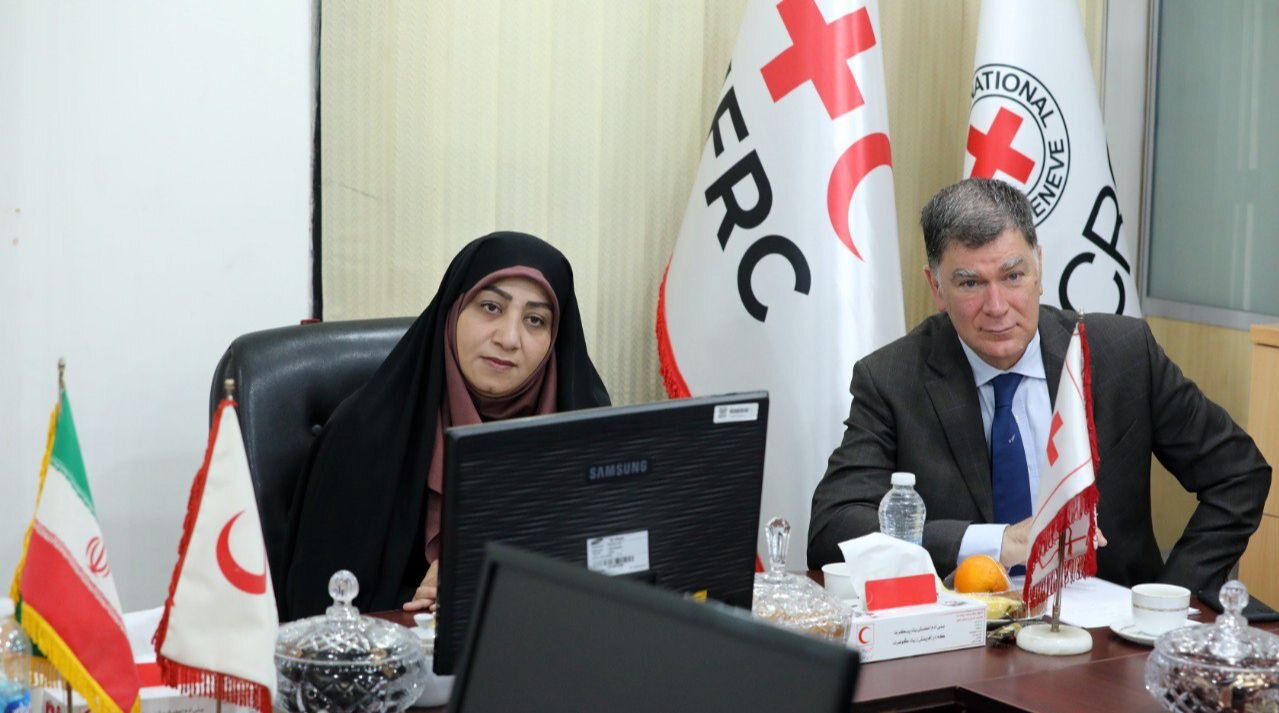IRCS ready to expand humanitarian services under IFRC support

TEHRAN – The Iranian Red Crescent Society (IRCS) has announced its readiness to expand its humanitarian services with the support of the International Federation of Red Cross and Red Crescent (IFRC).
Razieh Alishvandi, the IRCS director for international affairs, and Vincent Cassard, the representatives of the IFRC in Iran, held a meeting in Tehran on Monday on the occasion of the World Red Cross Week and the Day of ‘Humanitarian Diplomacy, Global Solidarity for the Preservation of Values’.
During the meeting, Alishvandi said the IRCS has been effectively participating in different international projects, including climate change and drought resilience.
The organization has conducted various programs to improve the situation of refugees and facilitate the families’ reunification with the help of the IFRC, she noted.
However, more is needed to be carried out to address climate change and drought resilience better in the country since the IRCS is capable of taking valuable measures in this regard, the official highlighted.
Alishvandi also presented a report on the performance of the IRCS at the Geneva meeting.
She said in the preliminary meeting of the 34th IFRC International Conference, the IRCS expressed its opinions, views, and recommendations on the content of five international resolution drafts that are scheduled to be officially approved in October.
“Informing and educating the public about the dangers caused by mines and unexploded ordnance is another successful project of the Iranian Red Crescent Society.”
Alishvandi went on to ask the IFRC to support IRCS plans regarding health, treatment, and rehabilitation issues and to increase the international financial resources to carry out humanitarian projects in Iran.
“We call upon the International Federation of Red Cross and Red Crescent as well as the representative of the Red Cross to endorse holding specialized training courses for staff and aid workers, as well as supporting relief operations of the Iranian Red Crescent Society,” she added.
Vincent Cassard, head of the International Committee of the Red Cross (ICRC) delegation in Tehran, for his part, said the performance of the IRCS in health, treatment, and rehabilitation is valuable and commendable.
“We stress boosting cooperation with the Iranian Red Crescent Society in health, treatment, and rehabilitation fields,” he noted.
IFRC seeks to boost co-op with IRCS
On May 10, the International Federation of Red Cross and Red Crescent (IFRC) expressed willingness to expand collaboration with the Iranian Red Crescent Society (IRCS).
Alishvandi, and Xavier Castellanos Mosquera, the IFRC undersecretary general for national society development and operations coordination, discussed ways to enhance cooperation.
The meeting was held on the sidelines of the preliminary session of the 34th IFRC international conference.
During the meeting, Alishvandi elaborated on IRCS capabilities in various fields of sanitary, treatment, rehabilitation, rescue and relief, logistics, education, volunteers, youth, climate change, crescent houses, mass gathering management, textile production, medical organizations, and many other things.
Castellanos Mosquera, for his part, acknowledging that the IRCS is one of the strongest members of the IFRC, said the IRCS could be a role model for other societies.
The official went on to ask the IRCS to share its expertise with IFRC by holding a webinar session and proposed the IFRC managers of different sectors, particularly logistics, and health, visit the IRCS medical equipment, artificial organ and prostheses production, and pharmaceutical companies, as well as rehabilitation centers to learn more about the IRCS experiences and knowledge.
"Despite the fact that the information of the Iranian Red Crescent Society has not yet been fully registered in the International Federation of Red Cross and Red Crescent health map, the range of services provided by the organization at the national level has placed it among the top societies compared to 107 national societies that have registered their information, Castellanos Mosquera noted.
He also suggested the full membership of the IRCS in a think tank which is formed to investigate the adverse impacts of sanctions.
MT/MG

Leave a Comment